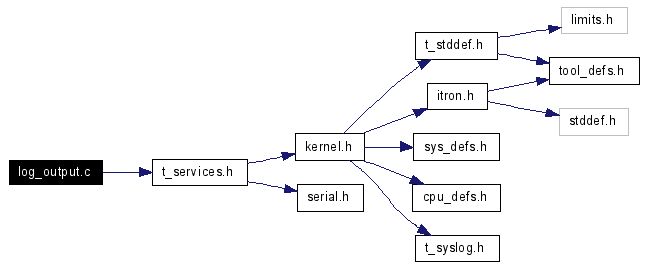log_output.c
システムログのフォーマット出力 [詳細]
#include <t_services.h>
log_output.cのインクルード依存関係図

マクロ定義 | |
| #define | _intptr_ long |
関数 | |
| static void | convert (unsigned _intptr_ val, unsigned int radix, const char *radchar, int width, int minus, int padzero, void(*putc)(char)) |
| void | syslog_printf (const char *format, VP_INT *args, void(*putc)(char)) |
| void | syslog_print (SYSLOG *p_log, void(*putc)(char)) |
| void | syslog_output (void(*putc)(char)) |
変数 | |
| static const char | raddec [] = "0123456789" |
| static const char | radhex [] = "0123456789abcdef" |
| static const char | radHEX [] = "0123456789ABCDEF" |
説明
システムログのフォーマット出力
log_output.c で定義されています。
マクロ定義
|
|
log_output.c の 51 行で定義されています。 参照元 syslog_printf(). |
関数
|
||||||||||||||||||||||||||||||||
|
log_output.c の 58 行で定義されています。 参照元 syslog_printf(). 00060 { 00061 char buf[12]; 00062 int i, j; 00063 00064 i = 0; 00065 do { 00066 buf[i++] = radchar[val % radix]; 00067 val /= radix; 00068 } while (val != 0); 00069 00070 width -= minus; 00071 if (minus > 0 && padzero > 0) { 00072 (*putc)('-'); 00073 } 00074 for (j = i; j < width; j++) { 00075 (*putc)((char)(padzero > 0 ? '0' : ' ')); 00076 } 00077 if (minus > 0 && padzero <= 0) { 00078 (*putc)('-'); 00079 } 00080 while (i > 0) { 00081 (*putc)(buf[--i]); 00082 } 00083 }
|
|
|
log_output.c の 182 行で定義されています。 参照先 LOG_TYPE_COMMENT・SYSLOG::logtype・syslog_print()・syslog_printf()・vrea_log(). 参照元 logtask(). 00183 { 00184 static const char lostmsg[] = "%d messages are lost."; 00185 SYSLOG log; 00186 INT lostnum, n; 00187 00188 lostnum = 0; 00189 while ((n = vrea_log(&log)) >= 0) { 00190 lostnum += n; 00191 if (log.logtype < LOG_TYPE_COMMENT) { 00192 continue; 00193 } 00194 if (lostnum > 0) { 00195 syslog_printf(lostmsg, (VP_INT *) &lostnum, putc); 00196 lostnum = 0; 00197 } 00198 syslog_print(&log, putc); 00199 } 00200 if (lostnum > 0) { 00201 syslog_printf(lostmsg, (VP_INT *) &lostnum, putc); 00202 } 00203 }
関数の呼び出しグラフ:  |
|
||||||||||||
|
log_output.c の 167 行で定義されています。 参照先 LOG_TYPE_ASSERT・LOG_TYPE_COMMENT・SYSLOG::loginfo・SYSLOG::logtype・syslog_printf(). 参照元 syslog_output(). 00168 { 00169 switch (p_log->logtype) { 00170 case LOG_TYPE_COMMENT: 00171 syslog_printf((const char *)(p_log->loginfo[0]), 00172 &(p_log->loginfo[1]), putc); 00173 break; 00174 case LOG_TYPE_ASSERT: 00175 syslog_printf("%s:%u: Assertion `%s' failed.", 00176 &(p_log->loginfo[0]), putc); 00177 break; 00178 } 00179 }
関数の呼び出しグラフ:  |
|
||||||||||||||||
|
log_output.c の 93 行で定義されています。 参照元 syslog_output()・syslog_print(). 00094 { 00095 int c; 00096 int width; 00097 int padzero; 00098 _intptr_ val; 00099 const char *str; 00100 00101 while ((c = *format++) != '\0') { 00102 if (c != '%') { 00103 (*putc)((char) c); 00104 continue; 00105 } 00106 00107 width = padzero = 0; 00108 if ((c = *format++) == '0') { 00109 padzero = 1; 00110 c = *format++; 00111 } 00112 while ('0' <= c && c <= '9') { 00113 width = width * 10 + c - '0'; 00114 c = *format++; 00115 } 00116 switch (c) { 00117 case 'd': 00118 val = (_intptr_)(*args++); 00119 if (val >= 0) { 00120 convert((unsigned _intptr_) val, 10, raddec, 00121 width, 0, padzero, putc); 00122 } 00123 else { 00124 convert((unsigned _intptr_)(-val), 10, raddec, 00125 width, 1, padzero, putc); 00126 } 00127 break; 00128 case 'u': 00129 val = (_intptr_)(*args++); 00130 convert((unsigned _intptr_) val, 10, raddec, 00131 width, 0, padzero, putc); 00132 break; 00133 case 'x': 00134 case 'p': 00135 val = (_intptr_)(*args++); 00136 convert((unsigned _intptr_) val, 16, radhex, 00137 width, 0, padzero, putc); 00138 break; 00139 case 'X': 00140 val = (_intptr_)(*args++); 00141 convert((unsigned _intptr_) val, 16, radHEX, 00142 width, 0, padzero, putc); 00143 break; 00144 case 'c': 00145 (*putc)((char)(_intptr_)(*args++)); 00146 break; 00147 case 's': 00148 str = (const char *)(*args++); 00149 while ((c = *str++) != '\0') { 00150 (*putc)((char) c); 00151 } 00152 break; 00153 case '%': 00154 (*putc)('%'); 00155 break; 00156 case '\0': 00157 format--; 00158 break; 00159 default: 00160 break; 00161 } 00162 } 00163 (*putc)('\n'); 00164 }
関数の呼び出しグラフ:  |
変数
|
|
log_output.c の 88 行で定義されています。 |
|
|
log_output.c の 90 行で定義されています。 |
|
|
log_output.c の 89 行で定義されています。 |
Copyright © 2006 by TAKAGI Nobuhisa.
このページは Mon Apr 3 23:49:16 2006 に Doxygen によって生成されました。